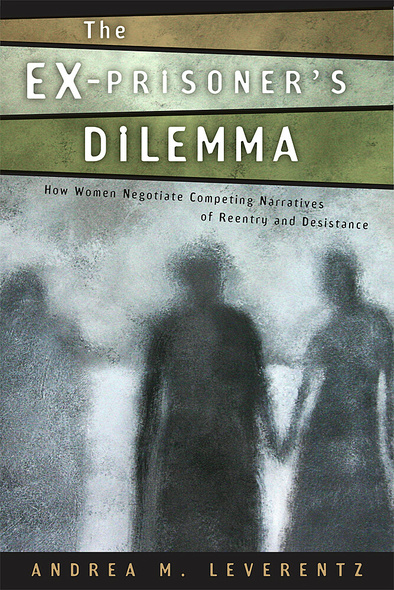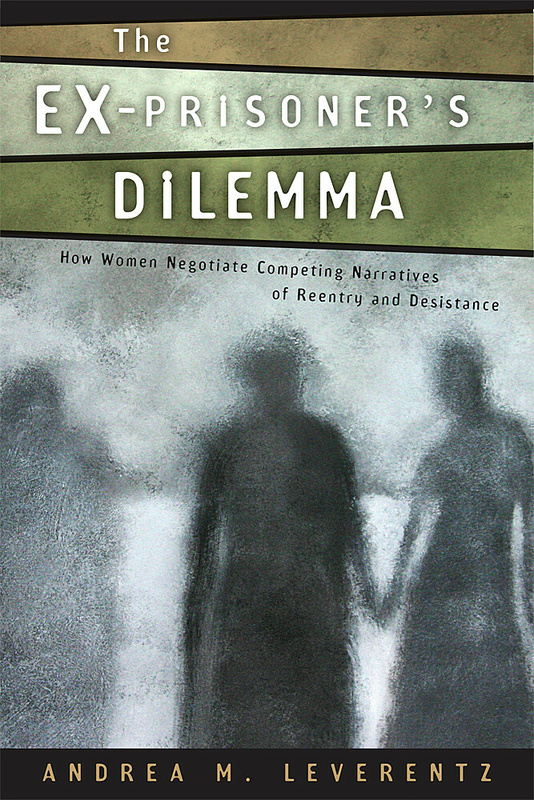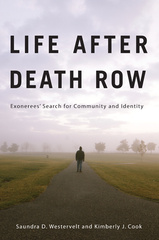The Ex-Prisoner's Dilemma
How Women Negotiate Competing Narratives of Reentry and Desistance
Rutgers University Press
2014 Choice Outstanding Academic Title
When a woman leaves prison, she enters a world of competing messages and conflicting advice. Staff from prison, friends, family members, workers at halfway houses and treatment programs all have something to say about who she is, who she should be, and what she should do. The Ex-Prisoner’s Dilemma offers an in-depth, firsthand look at how the former prisoner manages messages about returning to the community.
Over the course of a year, Andrea Leverentz conducted repeated interviews with forty-nine women as they adjusted to life outside of prison and worked to construct new ideas of themselves as former prisoners and as mothers, daughters, sisters, romantic partners, friends, students, and workers. Listening to these women, along with their family members, friends, and co-workers, Leverentz pieces together the narratives they have created to explain their past records and guide their future behavior. She traces where these narratives came from and how they were shaped by factors such as gender, race, maternal status, age, and experiences in prison, halfway houses, and twelve-step programs—factors that in turn shaped the women’s expectations for themselves, and others’ expectations of them. The women’s stories form a powerful picture of the complex, complicated human experience behind dry statistics and policy statements regarding prisoner reentry into society for women, how the experience is different for men and the influence society plays.
With its unique view of how society’s mixed messages play out in ex-prisoners’ lived realities, The Ex-Prisoner’s Dilemma shows the complexity of these women’s experiences within the broad context of the war on drugs and mass incarceration in America. It offers invaluable lessons for helping such women successfully rejoin society.
When a woman leaves prison, she enters a world of competing messages and conflicting advice. Staff from prison, friends, family members, workers at halfway houses and treatment programs all have something to say about who she is, who she should be, and what she should do. The Ex-Prisoner’s Dilemma offers an in-depth, firsthand look at how the former prisoner manages messages about returning to the community.
Over the course of a year, Andrea Leverentz conducted repeated interviews with forty-nine women as they adjusted to life outside of prison and worked to construct new ideas of themselves as former prisoners and as mothers, daughters, sisters, romantic partners, friends, students, and workers. Listening to these women, along with their family members, friends, and co-workers, Leverentz pieces together the narratives they have created to explain their past records and guide their future behavior. She traces where these narratives came from and how they were shaped by factors such as gender, race, maternal status, age, and experiences in prison, halfway houses, and twelve-step programs—factors that in turn shaped the women’s expectations for themselves, and others’ expectations of them. The women’s stories form a powerful picture of the complex, complicated human experience behind dry statistics and policy statements regarding prisoner reentry into society for women, how the experience is different for men and the influence society plays.
With its unique view of how society’s mixed messages play out in ex-prisoners’ lived realities, The Ex-Prisoner’s Dilemma shows the complexity of these women’s experiences within the broad context of the war on drugs and mass incarceration in America. It offers invaluable lessons for helping such women successfully rejoin society.
The Ex-Prisoner's Dilemma is a comprehensive and accessible introduction to the topic of women in reentry. The respondents’ words are compelling and illustrative; Leverentz clearly did a beautiful job with her study.
If there was ever any doubt, The Ex-Prisoner's Dilemma proves that the Chicago School is not just alive, but kicking. Probably the best existing example of longitudinal narrative research, Leverentz’s study is a tour de force.
Leverentz provides a comprehensive overview of how a sample of women leaving prison negotiates a world of competing messages regarding parenting, recovery from substance use, family dynamics, education, and employment. Using qualitative research methods, the author analyzes 49 previously incarcerated women to provide much-needed insight into the processes in which they navigate reentry to the community after serving prison terms. Practitioners will take away valuable insights for rehabilitation and prevention of recidivism. Scholars in numerous disciplines will find this text a delightful addition to collections in criminal justice, social sciences, research methods, and counseling. Highly recommended.
[Leverentz] provides a nuanced description of the lived experiences of women returning home from prison.The book makes it clear that the reentry process is far from linear and that social relationships, treatment, and social identity cannot be considered absent of the context of which it occurs. This book is beautifully crafted, making it an important read for students, scholars, and policy makers alike.
The Ex-Prisoner's Dilemma is a comprehensive and accessible introduction to the topic of women in reentry. The respondents’ words are compelling and illustrative; Leverentz clearly did a beautiful job with her study.
If there was ever any doubt, The Ex-Prisoner's Dilemma proves that the Chicago School is not just alive, but kicking. Probably the best existing example of longitudinal narrative research, Leverentz’s study is a tour de force.
Leverentz provides a comprehensive overview of how a sample of women leaving prison negotiates a world of competing messages regarding parenting, recovery from substance use, family dynamics, education, and employment. Using qualitative research methods, the author analyzes 49 previously incarcerated women to provide much-needed insight into the processes in which they navigate reentry to the community after serving prison terms. Practitioners will take away valuable insights for rehabilitation and prevention of recidivism. Scholars in numerous disciplines will find this text a delightful addition to collections in criminal justice, social sciences, research methods, and counseling. Highly recommended.
[Leverentz] provides a nuanced description of the lived experiences of women returning home from prison.The book makes it clear that the reentry process is far from linear and that social relationships, treatment, and social identity cannot be considered absent of the context of which it occurs. This book is beautifully crafted, making it an important read for students, scholars, and policy makers alike.
ANDREA M. LEVERENTZ is an associate professor of sociology at the University of Massachusetts, Boston.
Acknowledgments
Introduction
Part I: Becoming an Ex-Offender
1. The Mercy Home and the Discourse of Reentry and Desistance
2. Introducing the Women and Their Pathways to Offending
3. A Year in the Life: Evolving Perspectives on Reentry and Desistance
Part II: The Social Context of Reentry
4. Family Dynamics in Reentry and Desistance
5. Women's Chosen Relationships and Their Role in Self-Redefinition
6. Education, Employment, and a House of One's Own: Conventional Markers of Success
Conclusion
Appendix A: Respondent Characteristics
Appendix B: Research Methods
Notes
References
Index
Introduction
Part I: Becoming an Ex-Offender
1. The Mercy Home and the Discourse of Reentry and Desistance
2. Introducing the Women and Their Pathways to Offending
3. A Year in the Life: Evolving Perspectives on Reentry and Desistance
Part II: The Social Context of Reentry
4. Family Dynamics in Reentry and Desistance
5. Women's Chosen Relationships and Their Role in Self-Redefinition
6. Education, Employment, and a House of One's Own: Conventional Markers of Success
Conclusion
Appendix A: Respondent Characteristics
Appendix B: Research Methods
Notes
References
Index







